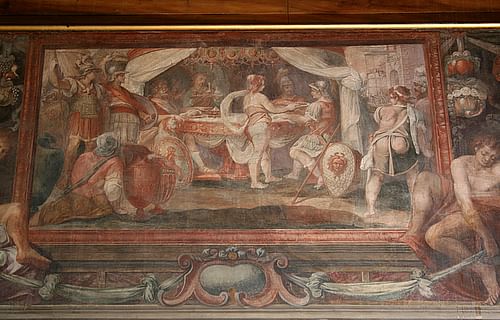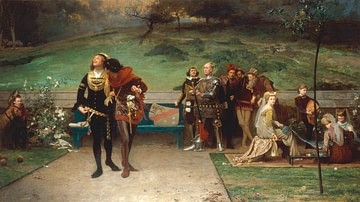
Titus Andronicus is the earliest tragedy by William Shakespeare (l. c.1564-1616), probably written sometime between 1589 and 1593, and first performed in 1594. Infamous for its gratuitous violence and two-dimensional characters, Titus Andronicus is quite different from Shakespeare's other works – indeed, although it was initially quite popular with Elizabethan audiences, it has since become regarded as his least esteemed play.
Background
Despite its initial popularity with the crowds of Elizabethan theatre, Titus Andronicus has been held in low regard since the 1700s and is still generally considered the worst of Shakespeare's plays. Dr. Samuel Johnson, writing in the 18th century, maintains that its use of barbaric violence "can scarcely be conceived tolerable to any audience," while T. S. Eliot, writing two centuries later, dismisses it entirely as "one of the stupidest and most uninspired plays ever written" (Bloom 78; McDonald, 1213). Throughout the centuries, literary scholars have been baffled by the idea that the author of Titus Andronicus could have possibly been the same genius who wrote such works as Macbeth and Othello, and, indeed, several have suggested that Shakespeare was not the author at all. However, most modern scholars would agree not only that Shakespeare did write the play but that it was an important step in the development of his career. As literary scholar Harold Bloom puts it: "[Titus Andronicus] matters only because Shakespeare, alas, undoubtedly wrote it, and by doing so largely purged Marlowe and Kyd from his imagination" (86).
By referencing Christopher Marlowe and Thomas Kyd, Bloom alludes to the classification of Titus Andronicus as a 'revenge play', a genre that was much in vogue in the early 1590s. Indeed, Marlowe was well-known for such revenge plays as The Jew of Malta (c. 1589) while Kyd's major contribution to the genre, The Spanish Tragedy (c. 1587), was probably the most popular play to grace the English stage until the advent of Hamlet (c. 1600). As a young playwright trying to make a name for himself in London, Shakespeare probably hoped to emulate the success of Marlowe and Kyd by writing his own revenge play, and their influence can clearly be seen in Titus Andronicus. Shakespeare's villainous character Aaron the Moor, for example, seems to have been closely modeled on Barabas, the wicked antihero of Marlowe's The Jew of Malta. Bloom demonstrates the similarities between the two characters by juxtaposing their respective monologues, wherein each character revels in committing evil acts for evil's sake. But while Marlowe's Barabas finds joy in pinning taunting messages to the corpses of men who have hanged themselves, Shakespeare's Aaron takes things a step further and carves his messages directly into the flesh of dead men. Thus, Bloom contends that Shakespeare has created a "Marlovian monster more outrageous than anyone in Marlowe" and has, therefore, surpassed him (82). Titus Andronicus is noteworthy, therefore, not necessarily for its own merits, but because it allowed Shakespeare to master the revenge play, achieve recognition as a playwright, and move beyond the influence of the likes of Marlowe and Kyd.
By going to see a revenge tragedy, Elizabethan playgoers would have expected a certain amount of blood and gore, much as a modern moviegoer would expect going to see the latest slasher film. Certainly, Titus Andronicus would have given them their money's worth – amongst the atrocities committed over the course of the play are 14 murders, several bodily mutilations, a gangrape, a live burial, and an instance of cannibalism. The earliest of these heinous acts are committed by the titular hero himself; we have barely met Titus Andronicus when he callously orders Queen Tamora's eldest son to be ritually sacrificed, shortly before murdering his own son in a fit of rage. From this point on, the violence is committed against Titus and his family – Titus not only loses two more sons and a hand, but his daughter Lavinia is brutally raped and mutilated. His final revenge seems to ring hollow; after cooking Demetrius and Chiron (Lavinia's rapists) into pies and serving them to their mother, Titus murders Lavinia in an honor killing. As Bloom notes, "one feels that the tormented Lavinia should have had some choice in the matter" of her own death (80). Aside from many of the characters feeling two-dimensional, Bloom argues that they moreover have no redeeming qualities, with the sole exception of Aaron the Moor, whose villainy is so over the top as to be quite funny. Indeed, Aaron's dialogue contains much of the wordplay in the show, and he has the honor of delivering this Shakespearean version of a "your mother" joke:
DEMETRIUS
Villain, what hast thou done?
AARON
That which thou canst not undo.
CHIRON
Thou hast undone our mother.
AARON
Villain, I have done thy mother.
(4.2.73-76).
Finally, it is worth noting that Titus Andronicus is the only one of Shakespeare's ancient Roman plays to not be based on a historical or semi-historical source. He seems to have drawn from the plays of Seneca – particularly Thyestes (c. 62 CE) – which had inspired the trend of Elizabethan revenge plays in the first place. The moment where Atreus cooks Thyestes' sons and serves them to their unsuspecting father was particularly instrumental to the climax of Shakespeare's own play. Additionally, Shakespeare drew from Ovid's Metamorphoses, constantly referencing the tragic tale of Philomel, who is raped by Tereus. Scholar Russ McDonald points out that Shakespeare was probably also influenced by the violent political landscape all around him, which was, in the 1590s, "a shadowy realm of religious intrigue, talk of treason, assassination attempts, and dirty tricks performed by the queen's secret police" (1217). One method of punishment for slandering the queen was to have one's hand cut off, something that occurs multiple times in Titus Andronicus; this leads McDonald to suspect that Shakespeare looked to his contemporary England as a model for this Roman drama.
Act I
The play opens shortly after the death of the Roman emperor, whose two sons, Saturninus and Bassianus, now stand before the masses to stake their claims on the imperial throne. Saturninus bases his claim on his right as the firstborn son, while Bassianus makes an emotional plea and reminds the people of his virtue. Amidst their argument comes Marcus Andronicus, the tribune of the people, who announces that his brother Titus has just returned from ten years of war against the Goths and that he has already been proclaimed emperor by the masses. Titus Andronicus, an aging yet powerfully built general and war hero, then enters in triumph. He is followed by his four living sons – Lucius, Quintus, Martius, and Mutius – his other 21 sons all having been slain on the battlefield. Titus also bears prisoners: Tamora, Queen of the Goths, is his captive, as are her three sons, Alarbus, Demetrius, and Chiron, and her lover, Aaron the Moor.
Titus proclaims his victory over the Goths and declares that Alarbus shall be taken away and ritually sacrificed in retribution for the deaths of his own sons. Tamora begs for the life of her eldest son, but the Romans do not listen, as Titus' sons drag Alarbus off to "hew his limbs till they be clean consumed" (1.1.129). Having sated his desire for revenge, Titus next turns his attention to the matter of the succession. He refuses to become emperor himself, stating that he is too old, and instead supports the claim of Saturninus, believing the eldest son should inherit. Saturninus is grateful for the support and offers to return the favor by marrying Lavinia, Titus' cherished daughter, an offer that the general accepts. Bassianus, however, has already been betrothed to Lavinia and is in love with her – rather than see her married to another man, he steals her away, with the help of Titus' sons. Titus pursues but is blocked by his youngest son Mutius. In a fit of rage, Titus slays Mutius for his insolence and refuses to even lay him in the family tomb until his other sons intercede on their brother's behalf.
Saturninus, meanwhile, is embarrassed by the whole debacle. Believing that Lavinia has purposefully scorned him, he refuses to marry her at all; instead, he takes Tamora as his empress and marries her immediately. Presently, Bassianus and Lavinia re-enter – also having hastily married – alongside Titus' surviving sons, and Tamora entreats her new husband to forgive them. Taking him aside, she privately explains that this forgiveness is only for show and that she will soon destroy the Andronici in revenge for the death of her son. Saturninus agrees and publicly 'forgives' Titus and his children for their transgressions. In return, Titus invites the new emperor and empress out for a hunt the next morning. All the characters depart except for Aaron the Moor, who is now left alone onstage.
Acts II & III
Aaron – who has kept silent until now – expresses his joy that Tamora has become empress; as her lover, this will surely open new opportunities for himself. His thoughts are interrupted by Tamora's two surviving sons, Demetrius and Chiron, who enter arguing with one another. They both claim to be in love with Lavinia and are fighting over which of them deserves her love. Aaron senses that it is not really her love they are after and suggests that during the hunt the next day, the two brothers should work together to catch Lavinia and rape her. The boys agree to the plan, and, when the hunting party gathers the next morning, Demetrius reminds his brother that "we hunt not, we, with horse nor hound / But hope to pluck a dainty doe to ground" (2.2.26-27). Acting on Aaron's plan, Demetrius and Chiron stab Bassianus to death and throw his body in a ditch before dragging Lavinia into the forest to rape her. When they are finished, they cut off her hands and rip out her tongue so that she cannot identify her attackers.

In the meantime, two of Titus' remaining sons – Quintus and Martius – stumble upon Bassianus' corpse. They are discovered here by the emperor's party and are arrested for the murder, as Aaron has forged a letter implicating them in Bassianus' death. Shortly thereafter, the tongueless and handless Lavinia is found wandering the fields by her uncle Marcus. After realizing what has happened, Marcus delivers a long monologue lamenting her fate, one that has become well-known for combining poetic language with gruesome imagery:
Alas, a crimson river of warm blood,
Like to a bubbling fountain stirred with wind,
Doth rise and fall between thy rosed lips,
Coming and going with thy honey breath.
But sure some Tereus hath deflowered thee,
And, lest thou shouldst detect him, cut thy tongue…
…O, had the monster seen these lily hands
Tremble like aspen leaves upon a lute
And make the silken strings delight to kiss them,
He would not then have touched them for his life.
(2.4.22-37).
Marcus resolves to take Lavinia to her father, even though the sight of her will surely destroy him. Indeed, Titus has been begging for the lives of Quintus and Martius, who have been condemned to death. The judges have refused to listen to his pleas, leaving Titus to "tell my sorrows to the stones / who, though they cannot answer my distress / yet in some sort they are better than the tribunes" (3.1.37-39). At that moment, Marcus enters with Lavinia, and the family members all weep together over the horrific fate that has befallen her. The touching scene is interrupted by Aaron, who brings a message from the emperor: Quintus and Martius will be pardoned if Titus will repent for their sins by cutting off one of his hands. Titus agrees and has Aaron cut off his hand. But after the Moor has exited, a messenger enters carrying the severed heads of Quintus and Martius – Aaron's offer had not been real, but merely another trick. Titus, who has no more tears to shed, can only laugh. He instructs his eldest – and now only – son, Lucius, to flee Rome and raise an army of Goths to fight back against Tamora and Saturninus.
Acts IV & V
Titus goes back home with Marcus, Lavinia, and his grandson Young Lucius. The young boy runs away from Lavinia, believing that she has gone insane – in actuality, she is trying to get the book he is carrying, which is a copy of Ovid's Metamorphoses. Lavinia turns the pages to the story of Philomela and Tereus, thereby revealing to her father that she has been raped. Then, holding a staff with her mouth and stumps, she writes the names of her attackers in the sand: "Stuprum ('rape' in Latin). Chiron. Demetrius" (4.1.78). Titus vows revenge on Tamora and her children. Tamora, meanwhile, has given birth to a baby – since the baby's skin color will be obvious proof that she has cheated on Saturninus with Aaron, she desires to have the child killed. Refusing to let this happen, Aaron kills the baby's nurse and flees with the child, deciding to return to the Goths and raise him there. This sudden compassion for his newborn son reveals a different side of Aaron, who previously has only committed evil acts.

Titus and his kinsmen go outside and shoot arrows, around which are tied petitions that list Saturninus' crimes. Saturninus is furious when he finds out about this and is even more enraged to learn that Lucius is raising an army of Goths – he knows that Lucius is more popular than him and could easily supplant him as emperor. Tamora tells her husband not to worry, promising to smooth things over with Titus by filling "his aged ears / with golden promises" (4.4.97-98). Believing Titus to be mad, Tamora goes to him disguised as the goddess Revenge; Chiron and Demetrius accompany her, disguised as her attendants Rape and Murder. Tamora, as Revenge, promises to destroy Titus' enemies if he will invite Lucius to a banquet at his house – her hope is to sow confusion amongst the Goths while Lucius is away, leaving them leaderless. Titus agrees, but only if Revenge will leave her attendants, Rape and Murder, with him. After Tamora exits, Titus and his kinsmen seize Chiron and Demetrius and tie them up. Lavinia holds a basin between her stumps to catch the blood as Titus cuts their throats, promising to "grind their bones to powder small / And with this hateful liquor temper it, / And in that paste let their vile heads be baked" (5.2.198-200).
Aaron, meanwhile, has been captured by a Goth soldier and is delivered to Lucius at his camp, along with his child. Initially, Lucius wants to hang the child first and force Aaron to watch him die, but the Moor protests – if Lucius will spare the boy, he will admit to everything he has done. When Lucius agrees, Aaron tells him not only about the true nature of Lavinia's rape and Bassianus' murder, but also about all the other evils he has committed. When a shocked Lucius asks if Aaron is sorry for his heinous deeds, he replies that he is only sorry he has not committed more:
Even now I curse the day, and yet I think
Few come within the compass of my curse,
Wherein I did not some notorious ill;
As kill a man, or else devise his death;
Ravish a maid, or else plot the way to do it;
Accuse some innocent, and forswear myself…
…Oft have I digged up dead men from their graves
And set them upright at their dear friends' door
Even when their sorrows almost was forgot,
And on their skins, as on the bark of trees,
Have with my knife carved with Roman letters
"Let not your sorrow die, though I am dead."
But I have done a thousand dreadful things
As willingly as one would kill a fly,
And nothing grieves me heartily indeed
That I cannot do ten thousand more.
(5.1.125-145).
After Aaron finishes speaking, Lucius claims that hanging is too gentle a punishment for him and orders him gagged. He is then informed of the banquet and returns to his father's house, where Titus, dressed as a chef, prepares to host the emperor and empress. After the pie is served, Titus asks Saturninus if it is right for a father to kill his daughter after she has been raped to preserve her honor. Once the emperor agrees that it is indeed right, Titus abruptly kills Lavinia with the words: "Die, die Lavinia, and thy shame with thee, / And with thy shame thy father's sorrow die" (5.3.46-47). Titus then reveals that he knows Lavinia has been ravished by Chiron and Demetrius; when Saturninus demands that the boys be brought out, Titus replies that they are here, baked into the pies they have been eating. Then, in quick succession, Titus kills Tamora and is, in turn, killed by Saturninus; Lucius then steps in and kills the emperor. The play ends as Lucius, proclaimed as the new emperor of Rome, decides to bury Aaron chest-deep and let him starve to death and throws Tamora's corpse to the animals.










